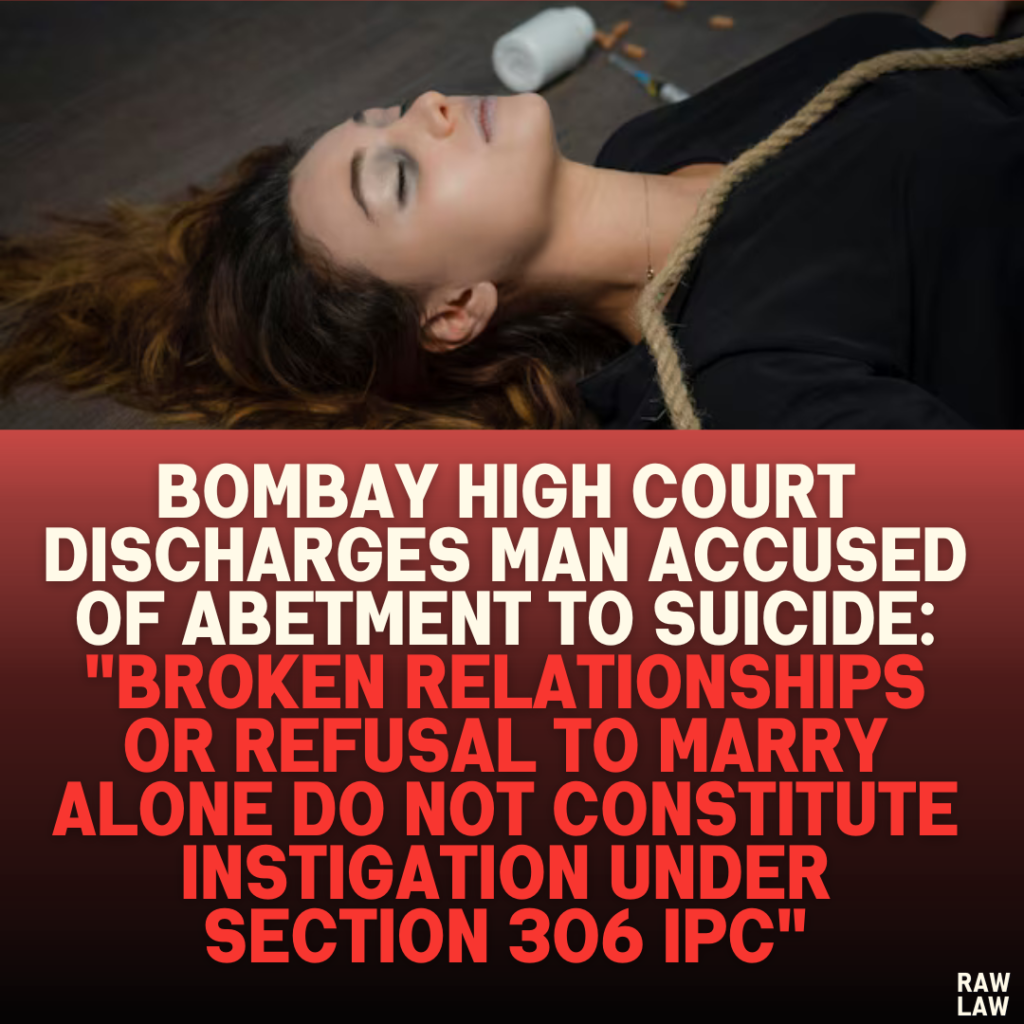Court’s Decision
The Bombay High Court discharged the applicant from charges under Section 306 IPC (abetment to suicide). The Court found that the evidence on record did not support a prima facie case of abetment. It quashed the Sessions Court’s earlier decision rejecting the applicant’s discharge application. The Court clarified that breaking a relationship, even if it caused emotional distress to the deceased, does not constitute abetment unless there is direct or indirect incitement or provocation by the accused.
Facts of the Case
- Relationship Details:
- The applicant and the deceased were in a consensual relationship for nine years.
- Their relationship ended in mid-2020 due to disagreements, and the applicant refused to marry the deceased.
- Suicide and Evidence:
- The deceased committed suicide in December 2020, leaving a suicide note.
- The note alleged emotional distress caused by the applicant’s refusal to marry her and his alleged relationship with another woman.
- During the investigation, police retrieved WhatsApp chats and other evidence.
- Nature of Evidence:
- WhatsApp chats showed that the relationship was consensual.
- There was no mention of coercion, instigation, or promises of marriage in the chats or the note.
- The relationship had ended several months before the suicide.
Issues Considered by the Court
- Did the applicant’s refusal to marry the deceased amount to abetment of suicide?
- Could the prosecution establish a causal link between the break-up and the deceased’s suicide under Section 306 IPC?
Petitioner’s Arguments
- The applicant argued that:
- The relationship was consensual and ended months before the suicide.
- The physical relationship was mutual and not based on any promise of marriage.
- There was no evidence to suggest instigation, provocation, or intent to abet the suicide.
- The prosecution’s case failed to establish any prima facie grounds for abetment.
Respondent’s Arguments
- The prosecution contended that:
- The applicant’s refusal to marry and his alleged relationship with another woman caused the deceased emotional distress, leading to her suicide.
- The suicide note and witness statements provided sufficient grounds for framing charges under Section 306 IPC.
Analysis of the Law
- Section 306 IPC – Abetment to Suicide:
- Section 306 criminalizes the abetment of suicide, requiring proof that the accused played a role in inciting, aiding, or instigating the act of suicide.
- Mere emotional distress or discord in relationships, without direct or indirect instigation, is insufficient to invoke this provision.
- Section 107 IPC – Definition of Abetment:
- Abetment involves:
- Instigating a person to commit a particular act.
- Engaging in a conspiracy that leads to the act.
- Intentionally aiding the act through direct or indirect means.
- Abetment involves:
- Court’s Reliance on Precedents:
- Ramesh Kumar v. State of Chhattisgarh (2001): Instigation must involve direct encouragement or provocation, and mere words in anger do not constitute abetment.
- M. Mohan v. State (2011): Mens rea (intention to abet) and a direct act leading to suicide are essential.
- Prabhu v. State (2024): A broken relationship or refusal to marry, without coercion, does not amount to abetment.
Court’s Reasoning
- Lack of Evidence for Abetment:
- The suicide note and WhatsApp chats showed no evidence of coercion, instigation, or a promise of marriage by the applicant.
- The evidence indicated a consensual relationship that ended months before the suicide.
- Absence of Proximity and Mens Rea:
- The suicide occurred five months after the relationship ended, breaking the causal link required for abetment.
- The applicant’s refusal to marry the deceased did not demonstrate an intent to provoke or instigate the suicide.
- Legal Principles:
- The Court emphasized that emotional distress from a broken relationship, while unfortunate, does not automatically imply criminal liability under Section 306 IPC.
- Mere harassment or disagreements are insufficient to constitute abetment unless accompanied by clear intent or direct provocation.
Conclusion
The Court allowed the applicant’s criminal revision application and discharged him of all charges under Section 306 IPC. It held that subjecting the applicant to trial based on insufficient evidence would amount to an abuse of the legal process.
Implications
- Clarification on Abetment:
- The judgment reiterates that criminal liability for abetment requires concrete evidence of intent and action, not merely circumstantial factors like emotional distress.
- Protection Against Misuse:
- It safeguards individuals from being unfairly prosecuted in cases involving broken relationships, emphasizing the importance of a fair assessment of evidence.



